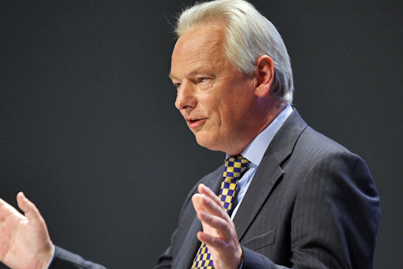House of Lords leads Commons in mobility
Android and Apple devices could change parliamentary business as the Houses come to terms with the cloud.

Viewers of the parliamentary channel may notice a change in the future as the members of the House of Lords troop in with their iPads and smartphones.
This was given as an example by Joan Miller, director of parliament IT, of how Government was beginning to adopt and adapt to new technologies.
Miller was describing to attendees at the Cloud Expo Europe 2011 conference the challenges she has faced in her five year tenure provisioning the IT needs of both the Commons and the Lords divisions of the Houses of Parliament.
Last week, the decision to allow mobile devices to be used whilst parliamentary business was being discussed was passed by the committee looking into the issue.
"You won't believe how much debate there was about whether it would be seemly to be engaged in debate where members can get information from the outside world. It might be unfair because they could face questions that were more clever than the questions they usually ask," she said.
Despite this acceptance, the House of Commons was still debating whether they should make similar concessions. A decision will be made over the next month.
Miller said the real problem facing her was how the private cloud could be merged with a public cloud. Several centuries of bureaucratic red tape, and the fact most parliamentary business was committed to paper, made the challenge of cloud adoption even greater, she said.
Sign up today and you will receive a free copy of our Future Focus 2025 report - the leading guidance on AI, cybersecurity and other IT challenges as per 700+ senior executives
The Houses of Parliament still have an annual bill of 20 million for paper and more than that on preserving the physical records, she added.
The Government has stepped into the public cloud but more by accident than design. Miller said 200 years' worth of Hansard reports on business have been scanned into a system and stored with Amazon Web Services, but elsewhere decisions had yet to be made.
"We had investment about three years ago, we built our virtual environment and we have pretty much expanded the boundaries of the applications we have now in that private cloud environment. We could get someone else to manage it but there's a great fear about someone interfering with the business of parliament," Miller said.
"If we're moving form that paper environment, we have to consider how we keep that data secure during the forming process. Where do we publish it and how do we publish it for people to use in the future not just this year but into the future."
-
 Trade body urges UK government to speed up National Semiconductor Strategy
Trade body urges UK government to speed up National Semiconductor StrategyNews Trade body techUK has urged the UK government to accelerate the implementation of the National Semiconductor Strategy.
-
 US lawmakers call for restrictions on software exports to Chinese chip companies
US lawmakers call for restrictions on software exports to Chinese chip companiesNews US government needs broader, systemic restrictions to avoid Chinese military innovation, says letter
-
 HP airs concerns over Government SMB IT deals
HP airs concerns over Government SMB IT dealsNews Tech giant has reportedly written to the Treasury to outline its concerns about the Government's ongoing SMB supplier push
-
 Government Compliancy in the IT Sector
Government Compliancy in the IT SectorIn-depth Compliance is paramount to government IT installations; Max Cooter explains why.
-
 Taxpayers' Alliance hits out at schools' "wasted" tablet investments
Taxpayers' Alliance hits out at schools' "wasted" tablet investmentsNews Campaign group claims schools are failing to make best use of technology.
-
 BlackBerry 7 OS certified to carry 'Restricted' UK government information
BlackBerry 7 OS certified to carry 'Restricted' UK government informationNews Canadian manufacturer retains foothold in the enterprise market.
-
 NAO: Police mobile rollout failing to deliver
NAO: Police mobile rollout failing to deliverNews The police are not getting enough benefits from the Mobile Information Programme, the NAO says.
-
 GCHQ says BlackBerry is safest
GCHQ says BlackBerry is safestNews GCHQ division CESG says BlackBerrys are the safest phones for sensitive Government data, as it offers smartphone security guidance.

